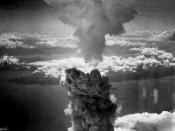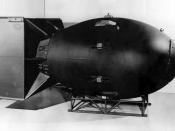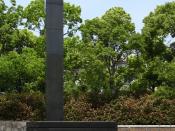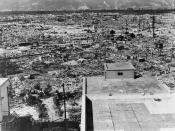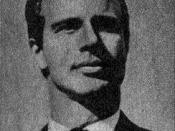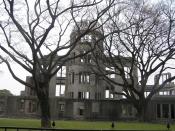Hiroshima and Its Impact In 1946, the year following the bombing of Hiroshima, The New Yorker magazine hires John Hersey, a notable American author to relate the story about the event and the possible consequences of nuclear warfare. To complete this task Hersey uses the unusual format of Thorton Wilder's book The Bridges of San Luis Rey, which is a fictional account of five individuals involved in a disaster in Peru. John Hersey writes Hiroshima which tells the interesting stories of the immediate and lasting effects the bomb does to change the lives of six survivors of the horrid event.
The atomic bomb explosion catches six survivors off guard, and forces three of them, Miss Toshiko Sasaki, Father Kleinsorge, and Dr. Masakazu Fujii to make important decisions. For example, Miss Sasaki, an employee at a tin factory, sits down to begin her work when she turns to talk to her neighbor but the bomb explodes to send the whole building and a leg twisting bookshelf onto her.
As Miss Sasaki lay in the rubble, no one comes to help her, so she is pinned beneath a bookshelf for two days. Miss Sasaki holds hope that her family is still living, but as her friend informs her later, they all perish because of the explosion. In addition, Father Kleinsorge, a German, priest, eats breakfast with other priests then goes to his room to read, but when the bomb explodes it sends him outside the building. Father Kleinsorge who is not badly injured finds a sense of helpfulness as he assists different victims. He tries to bring hope for a group of seriously injured soldiers when he informs them that a doctor is coming, for he gains a feeling of courage as he can withstand the death around him. Furthermore, Dr. Fujii, a local Hiroshima physician, is reading a paper when the bomb sends his clinic crashing upon him, for the clinic traps him in the water with just enough space for him to breathe. Dr. Fujii is in low spirits when he spends time recovering from war injuries at his friend's home. These survivors have many difficult times after the bomb is dropped, but they all do their best to help others who are not as fortunate as they were to be uninjured.
The massive atomic bomb explosion leaves a negatively lasting effect on the six interviewed survivors, for this explosion changes their lives. For instance, Miss Sasaki's leg and overall health falls then rises, but continues to fluctuate the rest of her life. She becomes a nun and travels the European lands, but she sees many deaths as her occupation tends to bring her. One particular inmate she visits describes to her how he kills a man, for she is disturbed repeatedly with what inmates tell her. Likewise, Father Kleinsorge receives many years of pain and bad health after the dripping of the bomb. He keeps his service through the church as long as he physically can, which is not entirely long. After the bombing Father Kleinsorge's health continues to deteriorate, for he dies of health complications which came from effects of the bombing. Finally, Dr. Fujii leads a comfortable life after the bombing until his life begins to spin downward, for after he loses his wife his health begins to fall from health problems associated with the bomb. He kept his clinic open as long as he could until his health made it impossible for him to run it any more, for his health follows those of most hibaskusha's, survivors of the bomb. After the death of his wife he loses total control of his health, for he dies a vegetable of a man some years later. The lasting effects of the atomic bomb leaves permanent scars in the lives of the hibakusha, for their lives for ever change in a negative way.
Japan's great drive for world domination leaves a trail of death and persecution to its citizens which haunts them for the rest of their lives. With over 100,000 dead, World War II is by far most destructive toward the innocent civilians of Hiroshima who the bomb drops on. John Hersey who sees first hand the effects of nuclear weaponry persuades humans to halt the further use of nuclear bombs toward people.
